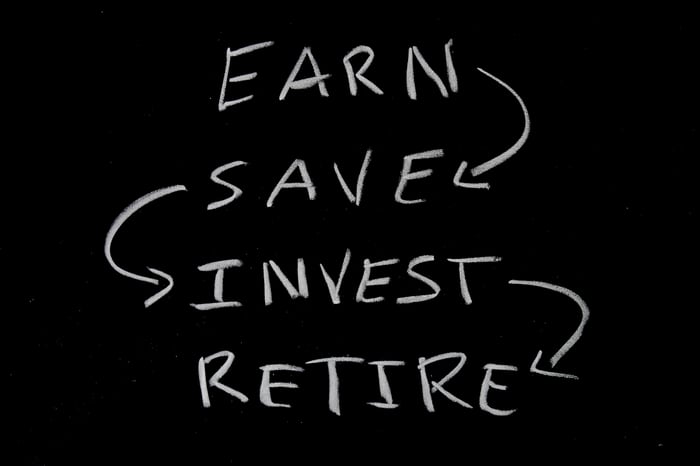Many of us could use a little wake-up call now and then to help get us on track (or back on track) in regard to our finances. Some wake-up calls can come from friends or relatives, others can come from our reading. Some take the form of charts or graphs, while others can simply be wise words spoken by others.
Here's a look at a dozen powerful quotations that can have you rethinking some of your money moves or simply making some smart moves starting now.

Image source: Getty Images.
No. 1: A dream doesn't become reality through magic; it takes sweat, determination and hard work. -- Colin Powell
This is a good reminder that though we may have many dreams -- of buying a home (or a bigger, better home) or a new car or of retiring early -- they're not likely to come true any time soon unless we take action now. And achieving the really big dreams, such as that early retirement, can take a lot of perseverance -- saving aggressively, investing effectively, living below our means, and doing so year after year.
No. 2: A budget is telling your money where to go instead of wondering where it went. -- Dave Ramsey
Without a budget, people will just spend on various necessary expenses (the electric bill and mortgage payment) and various wants (such as a new TV and a trip to Greece) without any master plan. There often won't be much left over for necessities such as retirement savings, and in a worst-case scenario, they may even spend more than they have, going into debt. With a plan, a budget, you can ensure that all your financial needs are met and then only splurge with what's left over.
No. 3: The price of anything is the amount of life you exchange for it. -- Henry David Thoreau
A good way to help yourself spend less is to think of the costs of various things in terms of the hours you work for them. For example, if your earnings average about $25 per hour at your job and you're about to buy a $200 coat, ask yourself if it's really worth eight hours of your life -- a whole workday. If you're tempted by a $3,000 dining room set, does it seem worth 120 of your hours? That's probably 10 to 15 days' worth of work, representing two or three weeks out of the whole year. Putting the price of things in perspective can help you make better spending decisions.
No. 4: Every time you borrow money, you're robbing your future self. -- Nathan W. Morris
This is underappreciated -- that when you take out a loan or add to your credit card debt balance, you're harming your future financial security. After all, as long as you're carrying debt, you're paying interest on it, and all those interest payments could have gone toward retirement savings or college savings or other important financial goals. Imagine, for example, carrying $20,000 in credit card debt, as many people do, and being charged 20% interest on it, as many people are. That will have you paying around $4,000 annually just for interest. Imagine how much money you could amass if you socked away $4,000 annually for, say, 15 years, earning an average of 8% on it. (The answer is more than $115,000!)

Image source: Getty Images.
No. 5: The amount of money you have has got nothing to do with what you earn. People earning a million dollars a year can have no money. People earning $35,000 a year can be quite well off. It's not what you earn, it's what you spend. -- Paul Clitheroe
This lesson is driven home every year or two when the media reports on an ordinary person with an ordinary job who managed to amass millions of dollars by saving, investing, and living relatively frugally. One janitor was worth $8 million when he died, and a secretary was able to leave $18 million to a hospital. A retired teacher left the Boston Public Library almost $7 million.
No. 6: When buying shares, ask yourself, would you buy the whole company? -- Rene Rivkin
This question makes more sense than you might think -- because when you buy shares of stock in a company, you are actually buying a part of it. You become a part owner, albeit with a tiny (but real) stake in it. Thus, it's worth thinking about the company and how comfortable you would be owning the whole thing. Do you have enough confidence in its future -- or can you think of other, more attractive and promising companies to own? Concentrate your dollars on your best ideas.
No. 7: The Stock Market is designed to transfer money from the Active to the Patient. -- Warren Buffett
Various studies have shown how investors underperform when they trade frequently, only owning various stocks and other things for a few hours, days, or weeks. That leaves them paying a lot in trading commissions and also, if and when they realize gains, facing short-term capital gains tax rates that tend to be significantly higher than long-term capital gains tax rates. (For most people, the long-term rate is 15%, and the short-term rate is your ordinary income tax rate, which could top 30%.) For best results investing, aim to hang on to great companies for many years, through ups and downs.

Image source: Getty Images.
No. 8: Don't look for the needle in the haystack. Just buy the haystack. -- John Bogle
John Bogle, founder of Vanguard, is also known as the father of index funds. With a broad-market index fund such as one that tracks the S&P 500, instead of trying to study lots of companies and invest in the best ones, you just have your money spread over all the companies in an index. That may sound more boring than investing in individual stocks or mutual funds, but it's very easy and convenient -- and it's hard to beat a broad-market stock index: Over the 15 years ending in June 2018, about 92% of U.S. large-cap stock mutual funds lagged the returns of the S&P 500. The pattern holds true for indexes of smaller companies, too. About 95% of U.S. mid-cap stock funds trailed the popular S&P MidCap 400 index over those 15 years, while the S&P SmallCap 600 index outperformed nearly 98% of all U.S. small-cap funds.
No. 9: I am prepared for the worst, but hope for the best. -- Benjamin Disraeli
This is a great reminder to be sure you have sufficient protection through insurance. Few people who die young ever expected to, and many end up leaving their families financially strapped. Many renters don't realize they can (and should) buy renter insurance to protect their belongings. Take a few minutes to review all kinds of insurance and protect any financial loss you can't afford -- or don't want to experience.
This quotation applies to your investing as well. It's best to save aggressively for retirement, as you don't know how much health insurance or other things will cost you far in the future. Hope for minimal costs, but be ready to pay.
No. 10: It's how you deal with failure that determines how you achieve success. -- David Feherty
Many people, when they experience a big loss in a stock or when they see their portfolio shrink due to a market crash, decide to never have that happen again. They sell and swear off investing in stocks. That's not the best reaction. Market crashes happen relatively frequently and have always been followed by eventual recoveries. And even the best investors have invested in some stocks that have tanked. For best results when investing, read up on the topic so that you have some historical grounding and perspective. Expect market crashes and some regrettable investments. Plan to invest for the long term, through ups and downs.
No. 11: An investment in knowledge pays the best interest. -- Benjamin Franklin
We often think of investments merely as stocks, bonds, and mutual funds. But we make lots of different kinds of investments in our lives: We invest in people and relationships, we invest in careers, and we invest in ourselves. A great way to invest in yourself is to keep learning throughout your life. Through learning, you can add more skills (and even certifications and professional designations) to your resume, helping you climb your career ladder -- or change professions. Through learning, you can also gain insights into human nature and how to be more successful in life.
No. 12: The real measure of your wealth is how much you'd be worth if you lost all your money. -- Unknown
Money is important. But it's easy to focus so much on money -- on making it, saving it, keeping it, investing it, spending it -- that you lose sight of other important things, such as your family and your values. It's also easy to see your level of wealth as the most important indicator of your success. Superinvestor Warren Buffett would take issue with that. Here's how he views success: "Basically, when you get to my age, you'll really measure your success in life by how many of the people you want to have love you actually do love you."




